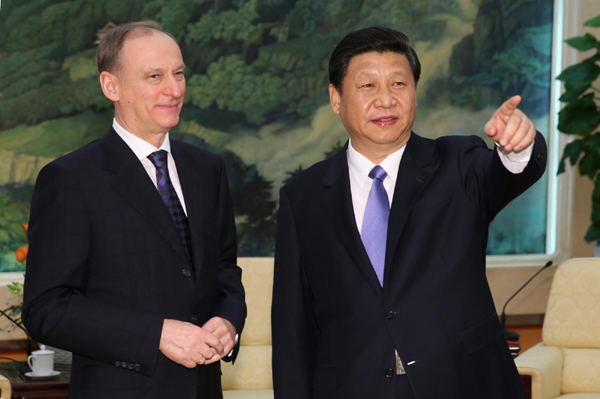Thriving neighborhood vital for peaceful rise
Updated: 2015-01-27 07:33
(China Daily)
|
||||||||
 |
|
Xi Jinping (R), general secretary of the Communist Party of China Central Committee, meets with Russian Security Council Secretary Nikolai Patrushev in Beijing, capital of China, Jan 8, 2013. [Photo/Xinhua] |
China's neighborhood appeared to be generally stable last year, although some regional security problems continued posing a threat. The strategic containment policies by major powers such as the United States, and pressing issues like territorial disputes, separatism and terrorism, comprised most of the destabilizing factors for China.
Delivering an important speech at a conference on diplomatic work in Beijing in October, President Xi Jinping vowed to accord priority to neighborhood diplomacy as part of China's overall diplomacy. The conference, presided over by Li Keqiang, the Premier, stressed the significance of establishing a neighborhood community of shared destiny.
By proposing the "One Belt and One Road" initiatives, helping establish the Asian Infrastructure Investment Bank, and setting up the Silk Road Fund, China honored its commitments to the economic betterment of its Asian neighbors.
China's commitments to peripheral diplomacy were a response not only to the complicated and volatile environment it faces, but also to address its growing strength and thus the need for protecting its national security.
In retrospect, China's diplomatic efforts were marked by two major changes last year.
To begin with, it played a more active part in multinational cooperation in regional security, especially in "setting the agenda". In his keynote address to the Conference on Interaction and Confidence-Building Measures in Asia in Shanghai in May, Xi proposed a new Asian security cooperation framework, featuring a common, comprehensive, cooperative and sustainable security strategy. His appeal for "Asians to be responsible for Asian affairs" was echoed by leaders of many countries attending the conference.
Second, military exchanges and security-oriented cooperation between China and some other major powers, including the US, Russia and India, added weight to their fight against both traditional and non-traditional security threats. In fact, Beijing and Washington reached a number of agreements on issues such as cybersecurity, food safety and fighting pirates.
China-Russia cooperation and China-India coordination reflected similar efforts, with the former focusing on satellite navigation and energy exchanges, and latter resulting in India-China anti-terrorism joint training exercise in Pune, India, in November.
- Global health entering new era: WHO chief
- Brazil's planning minister steps aside after recordings revelation
- Vietnam, US adopt joint statement on advancing comprehensive partnership
- European border closures 'inhumane': UN refugee agency
- Japan's foreign minister calls A-bombings extremely regrettable
- Fukushima impact unprecedented for oceans: US expert

 Stars of Lijiang River: Elderly brothers with white beards
Stars of Lijiang River: Elderly brothers with white beards
 Wealthy Chinese children paying money to learn British manners
Wealthy Chinese children paying money to learn British manners
 Military-style wedding: Fighter jets, grooms in dashing uniforms
Military-style wedding: Fighter jets, grooms in dashing uniforms
 Striking photos around the world: May 16 - May 22
Striking photos around the world: May 16 - May 22
 Robots help elderly in nursing home in east China
Robots help elderly in nursing home in east China
 Hanging in the air: Chongqing holds rescue drill
Hanging in the air: Chongqing holds rescue drill
 2.1-ton tofu finishes in two hours in central China
2.1-ton tofu finishes in two hours in central China
 Six things you may not know about Grain Buds
Six things you may not know about Grain Buds
Most Viewed
Editor's Picks

|

|

|

|

|

|
Today's Top News
Liang avoids jail in shooting death
China's finance minister addresses ratings downgrade
Duke alumni visit Chinese Embassy
Marriott unlikely to top Anbang offer for Starwood: Observers
Chinese biopharma debuts on Nasdaq
What ends Jeb Bush's White House hopes
Investigation for Nicolas's campaign
Will US-ASEAN meeting be good for region?
US Weekly

|

|







